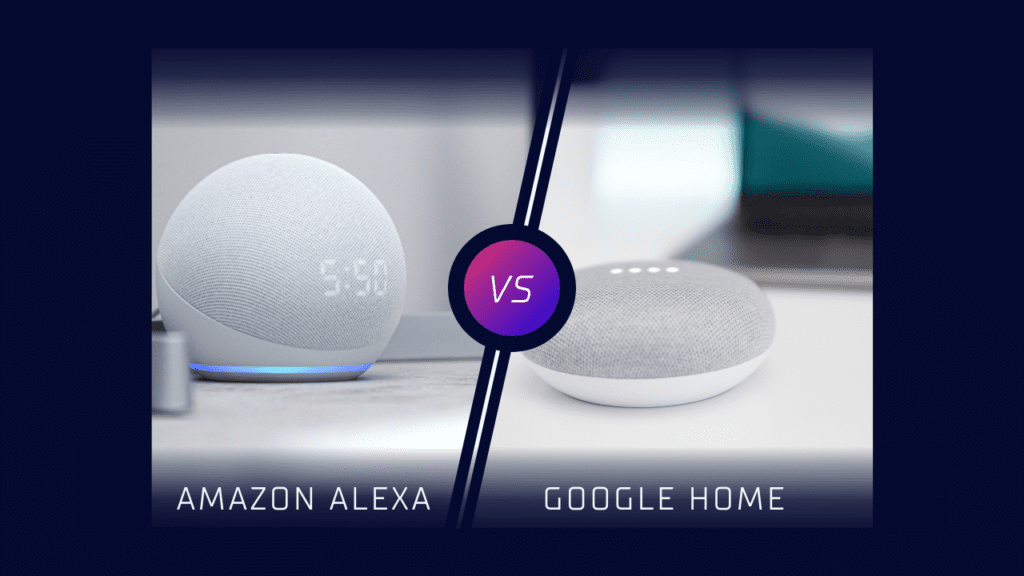We want you to know that this site is supported by our users. Some of the links you’ll find on our site are affiliate links, and if you make a purchase through those links, we may earn a commission at no extra cost to you. Thank you for your support – it’s what keeps us going!
The rise of voice-controlled smart speakers has introduced us to the world of AI-powered virtual assistants. Among the leading contenders, Alexa from Amazon and Google Home with Google Assistant have emerged as the primary choices for consumers. In this match-up of Alexa vs Google Home, we will delve into each major category and declare a winner to help you decide which smart speaker best suits your needs and deserves a place in your smart home.
Alexa vs Google Home: In-Depth Comparison
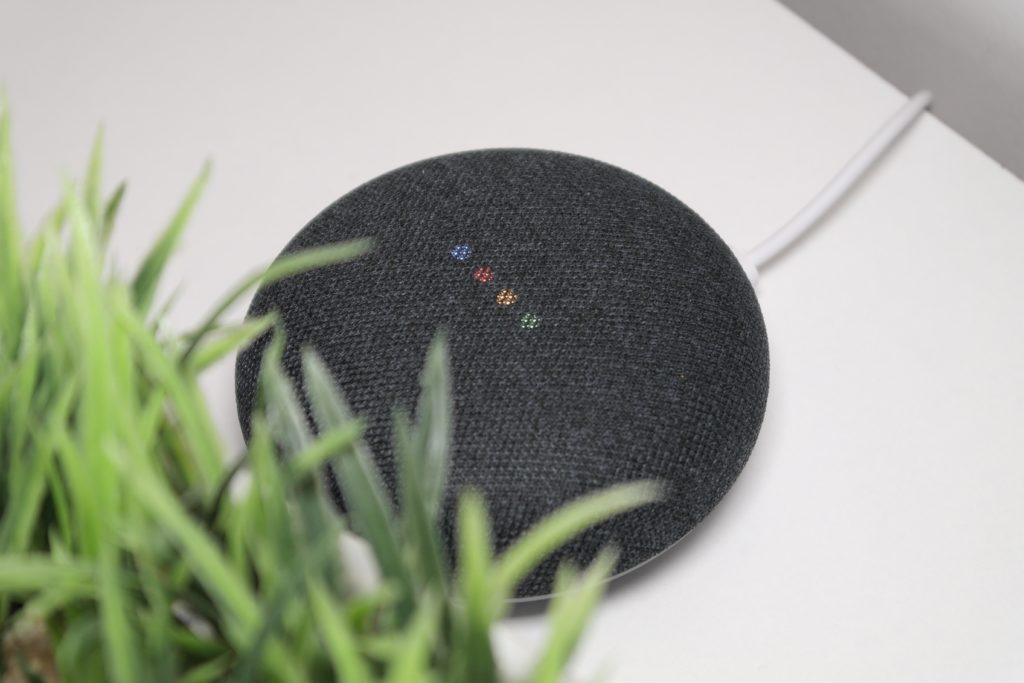
Speech Recognition and Natural Language Processing
One of the fundamental aspects of a voice-controlled smart speaker is its ability to accurately understand and interpret natural language commands. Both Alexa and Google Home have made significant advancements in this area, utilizing sophisticated speech recognition and natural language processing algorithms.
Alexa, powered by Amazon, has a strong track record in speech recognition. It has a high success rate in understanding commands even in noisy environments and can effectively process a wide range of accents and dialects. Alexa’s ability to comprehend complex queries has improved over time, making it an efficient assistant for tasks such as answering questions, setting reminders, or providing weather updates.
On the other hand, Google Home, backed by Google Assistant, also boasts impressive speech recognition capabilities. Google’s extensive experience in language processing and its powerful knowledge graph enable Google Home to grasp nuanced commands and provide accurate responses. Google Home has an edge in understanding context and can handle follow-up questions more effectively, creating a more conversational experience.
While both devices perform admirably in speech recognition and natural language processing, Google Home’s integration with Google’s knowledge graph gives it a slight advantage in understanding complex queries and providing contextually relevant answers. Users may find Google Home to be more adept at handling natural language interactions, especially when dealing with detailed questions or engaging in extended conversations. Therefore, in the category of Speech Recognition and Natural Language Processing, the winner is Google Home.
It’s worth noting that both Alexa and Google Home continuously improve their speech recognition capabilities through regular software updates. Therefore, while Google Home may have a slight lead currently, it’s essential to consider that advancements in this area can change the landscape in the future.
Winner: Google Home
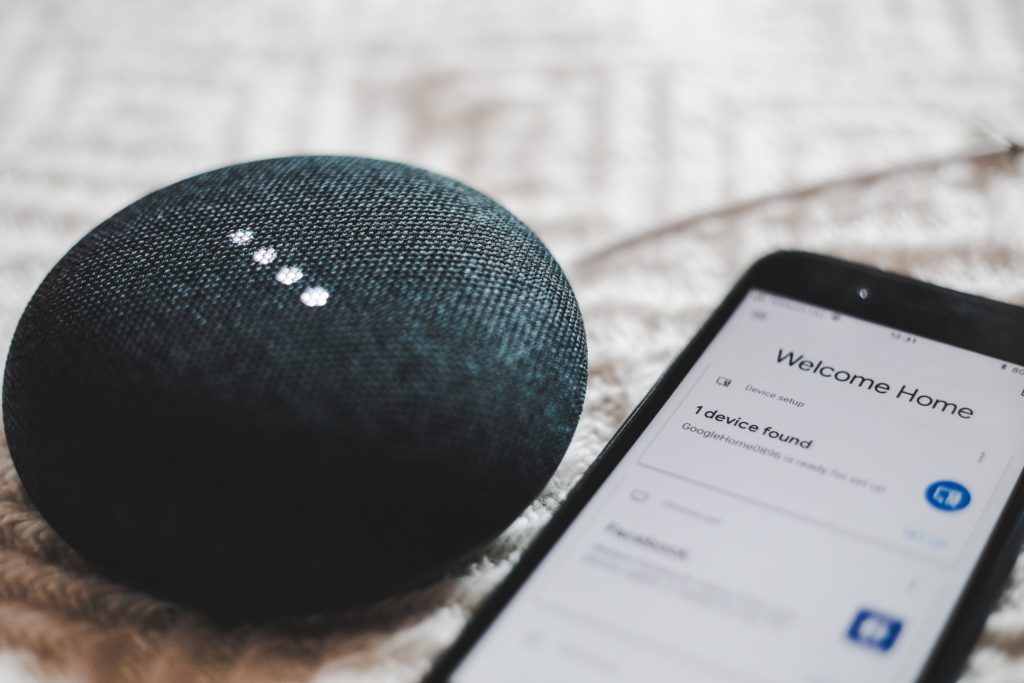
Smart Home Integration
One of the key reasons people invest in smart speakers is to control their smart home devices seamlessly. Both Alexa and Google Home excel in this area, offering extensive compatibility with a wide range of smart home devices.
Alexa, with its Echo devices and extensive ecosystem, has established itself as a leader in smart home integration. It supports a vast array of devices from various manufacturers, including lights, thermostats, locks, cameras, and more. Alexa’s compatibility extends beyond popular brands, with support for many third-party devices through its open platform. This broad compatibility allows users to build a comprehensive smart home system and control multiple devices with voice commands.
Google Home, powered by Google Assistant, also offers robust smart home integration. It supports a wide range of devices, although its ecosystem may not be as extensive as Alexa’s. However, Google Home has the advantage of seamless integration with other Google services and devices. For example, it can integrate with Google Nest products, such as thermostats and cameras, providing a cohesive smart home experience for users already invested in the Google ecosystem.
When it comes to the sheer number of compatible devices, Alexa currently holds the edge due to its larger ecosystem and broader third-party integration. However, it’s important to note that the gap between the two platforms has narrowed significantly over time, and Google Home continues to expand its compatibility with various smart home devices.
Ultimately, the choice between Alexa and Google Home for smart home integration depends on the specific devices you own or plan to acquire. If you have a diverse range of smart home devices from different manufacturers, Alexa’s extensive compatibility may be more beneficial. On the other hand, if you are already integrated into the Google ecosystem or prefer the seamless experience with Google Nest products, Google Home may be the preferred choice.
In the category of Smart Home Integration, while Alexa boasts a larger ecosystem of compatible devices and broader third-party integration, Google Home’s integration with Google services gives it an advantage for users invested in the Google ecosystem. Therefore, the winner in this category may vary depending on the user’s specific smart home setup and preferences.
Winner: Alexa
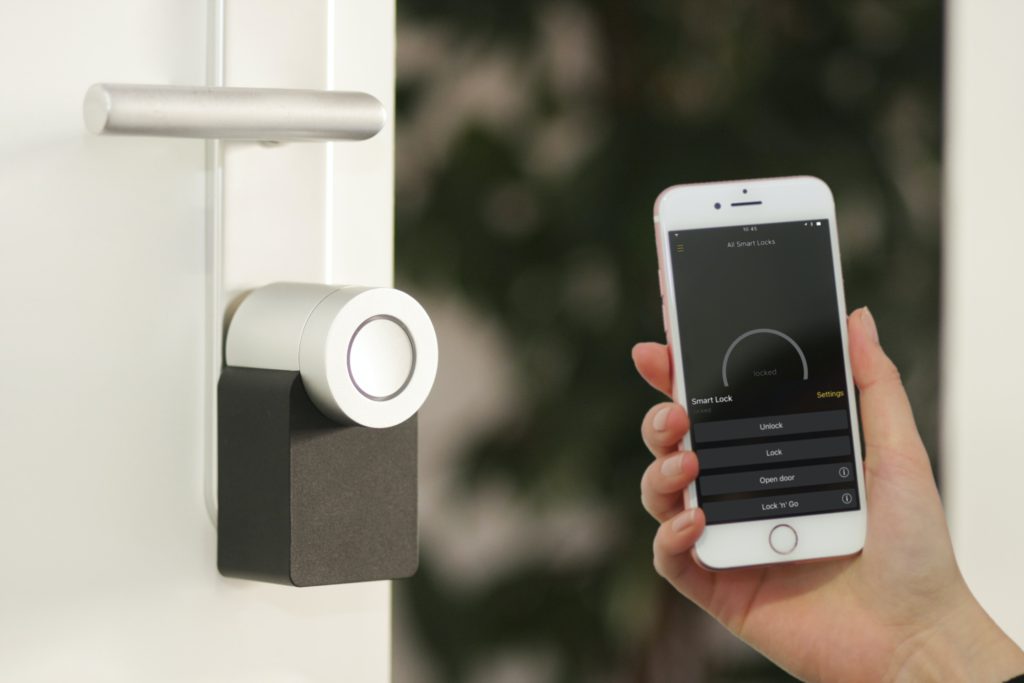
Skills and Actions
One of the key features that enhance the functionality of smart speakers is the ability to extend their capabilities through third-party integrations. Both Alexa and Google Home offer this functionality, with Alexa using “Skills” and Google Home utilizing “Actions” to expand their range of abilities.
Alexa, powered by Amazon, boasts an extensive library of third-party Skills. These Skills are developed by various companies and individuals, enabling Alexa to perform additional tasks beyond its built-in capabilities. Skills cover a wide range of categories, including entertainment, productivity, education, smart home control, and more. Users can enable Skills through the Alexa app or by voice command, allowing Alexa to interact with specific apps, order food, play games, provide workout routines, and much more. With thousands of Skills available, Alexa offers a vast selection to enhance the user experience.
Similarly, Google Home utilizes Actions to extend its functionality. Actions provide a way for developers to integrate their services and apps with Google Assistant. Users can activate Actions by voice command, unlocking additional capabilities and services. While the number of Actions available may not be as extensive as Alexa’s Skills, Google Home covers a wide range of categories, including communication, travel, news, finance, and more. Google Home can interact with apps like Spotify, Uber, and Google Maps, enabling users to enjoy personalized music, order rides, and get real-time traffic updates.
In terms of sheer quantity, Alexa currently boasts a larger selection of Skills, offering users a broader range of third-party integrations. This vast ecosystem of Skills has been developed over the years, making Alexa a more versatile assistant for specific tasks and niche interests.
However, it’s important to note that the availability and quality of Skills and Actions can vary depending on the specific region and language. Some Skills and Actions may be more developed or relevant in certain countries or languages, so it’s essential for users to consider their specific needs and geographic location.
In the category of Skills and Actions, Alexa takes the lead due to its larger and more mature ecosystem of third-party Skills. However, it’s worth mentioning that both platforms continue to expand their offerings, and the availability of specific Skills and Actions may vary based on individual preferences, geographic location, and the integration requirements of different apps and services.
When choosing between Alexa and Google Home based on Skills and Actions, users should consider their specific needs and the availability of integrations for the services they rely on the most.
Winner: Alexa
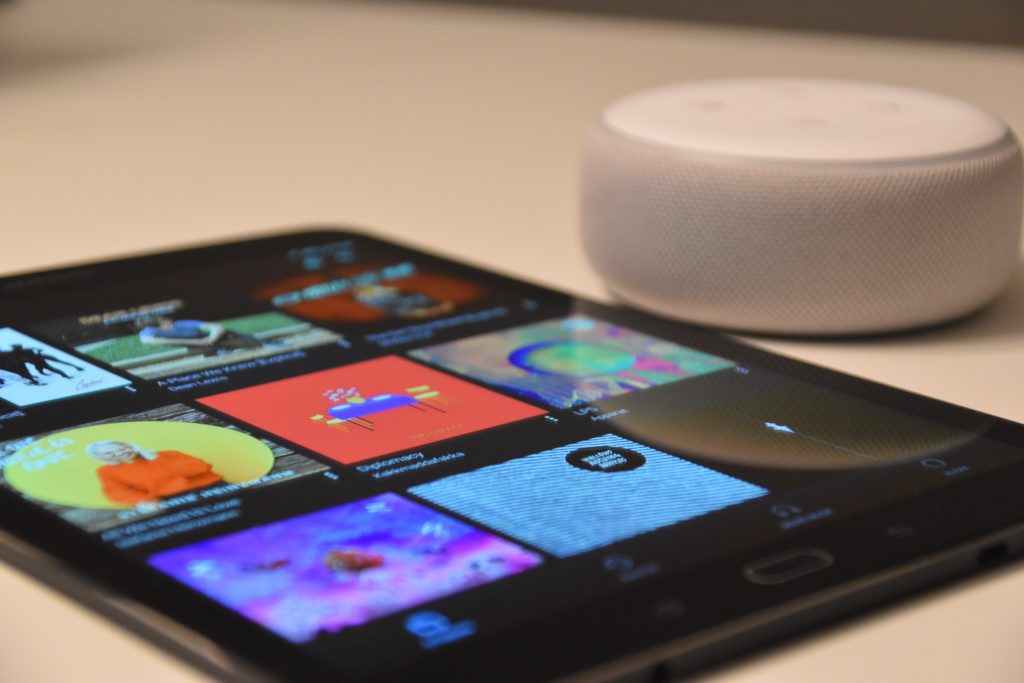
Media Playback and Content
A significant aspect of smart speakers is their ability to entertain users with media playback and provide access to a wide range of content. Both Alexa and Google Home offer various options for media consumption, but there are some distinctions to consider.
Alexa, powered by Amazon, provides users with a seamless experience for accessing music, audiobooks, and podcasts. With its integration with Amazon Music, users can easily stream their favorite songs, create playlists, and even purchase music directly from Amazon. Alexa also supports other popular music streaming services like Spotify, Pandora, and Apple Music, allowing users to choose their preferred platform. Additionally, Alexa offers a vast selection of audiobooks through Audible, providing a rich library of literary content. Users can simply ask Alexa to play a specific book or even resume where they left off. Moreover, podcasts have gained popularity, and Alexa enables users to listen to their favorite podcasts through services like TuneIn and Spotify.
Google Home, powered by Google Assistant, offers similar capabilities for media playback and content consumption. Users can stream music from popular services like YouTube Music, Spotify, and Google Play Music, and control playback using voice commands. Google Home also supports podcast playback from various platforms, including Google Podcasts, Spotify, and other podcast apps linked to the user’s Google account. Additionally, Google Home has the advantage of its deep integration with YouTube, allowing users to play and control YouTube videos on compatible devices with just their voice.
When it comes to media playback and content, both Alexa and Google Home provide access to a wide range of music, audiobooks, and podcasts. However, Alexa’s integration with Amazon Music and Audible gives it an edge in terms of a more seamless and extensive music and audiobook library. On the other hand, Google Home’s integration with YouTube offers unique capabilities for video playback, making it an attractive choice for users who enjoy consuming visual content.
It’s worth noting that the availability of specific music streaming services, audiobooks, and podcasts may vary based on geographic location and licensing agreements. Users should ensure that their preferred services are supported by the respective smart speaker before making a final decision.
In the category of Media Playback and Content, both Alexa and Google Home offer robust options for entertainment. The choice between the two would depend on individual preferences, existing subscriptions to specific music streaming services, and the importance of video playback capabilities through YouTube integration.
Winner: Alexa

Personalization and Context
A key aspect of a smart speaker is its ability to provide personalized responses based on the user’s preferences, habits, and contextual information. Both Alexa and Google Home strive to deliver tailored experiences, but they approach personalization and context in different ways.
Google Home, powered by Google Assistant, leverages the vast amount of data collected from various Google services, including search history, calendar events, location data, and more. By tapping into this wealth of information, Google Home can offer highly personalized responses and recommendations. For example, if you have a scheduled appointment, Google Home can provide you with traffic updates and estimated travel times based on real-time data. Additionally, it can remember past interactions, making the conversation feel more continuous and seamless.
On the other hand, Alexa, developed by Amazon, has also made strides in personalization and context-awareness. Alexa can learn user preferences over time, such as favorite music genres or frequently used skills. It can provide personalized recommendations based on these preferences and adapt its responses accordingly. Alexa’s integration with Amazon services allows it to offer customized shopping suggestions and reorder items based on past purchase history.
While both platforms offer personalization, Google Home tends to excel in providing more accurate and contextually relevant responses due to its access to the extensive knowledge graph and user data from various Google services. This allows Google Home to understand the context of the conversation better and provide more precise answers. Google Home’s ability to seamlessly integrate with other Google services also contributes to a more personalized user experience.
That said, it’s worth noting that personalization features can vary based on user settings and the extent to which users allow the smart speaker to access their data. Privacy settings and the amount of personal information shared with the devices play a role in determining the level of personalization and context provided by Alexa and Google Home.
In the category of Personalization and Context, Google Home emerges as the winner due to its access to a broader range of user data from Google services, allowing for highly personalized responses and recommendations. However, users should also consider their comfort level with sharing personal data and adjust privacy settings accordingly to strike the right balance between personalization and privacy.
Winner: Google Home
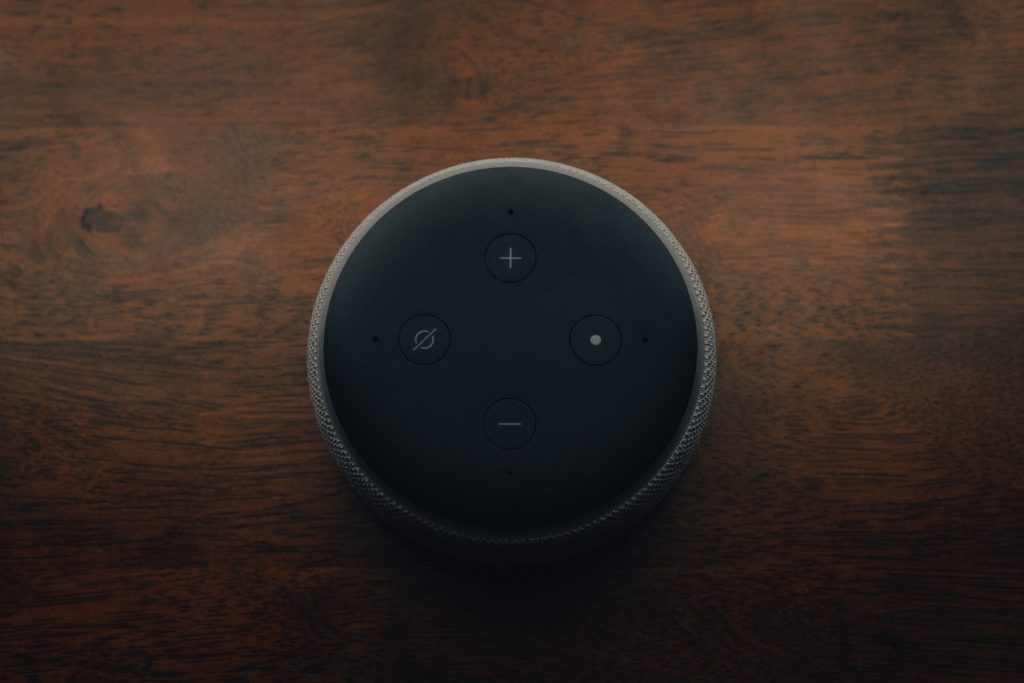
Privacy and Data Handling
Privacy and data handling are important considerations when choosing a smart speaker, as these devices often collect and process personal information. Both Alexa and Google Home have implemented measures to address privacy concerns, but their approaches and business models differ.
Alexa, developed by Amazon, has taken steps to prioritize user privacy. Amazon allows users to review and delete their voice recordings stored by Alexa. In addition, Alexa devices offer a physical mute button that physically disconnects the microphone, providing a clear indication of when the device is not actively listening. Amazon also provides granular control over privacy settings through its Alexa app, allowing users to manage the data shared with Alexa and control the skills that have access to personal information.
Google Home, powered by Google Assistant, operates under Google’s business model, which focuses on data collection and targeted advertising. While Google has made efforts to enhance privacy features, such as allowing users to manage their activity data and offering options to auto-delete recordings after a certain period, it’s important to note that Google’s data collection practices are more extensive compared to Amazon. Google Home devices are designed to listen for a “wake word” to activate, but they may still retain and process small snippets of audio data before and after the wake word is detected. Users have the ability to review and delete these recordings through their Google account settings.
It’s crucial for users to carefully consider their comfort level with data collection and how it aligns with their privacy preferences. Amazon’s emphasis on privacy and its less data-intensive approach may appeal to users who prioritize data protection and limited data sharing. On the other hand, Google Home’s data collection practices and targeted advertising capabilities may raise privacy concerns for users who are more cautious about sharing personal information.
In the category of Privacy and Data Handling, Alexa is the winner due to Amazon’s focus on privacy and the options provided to users to manage their data. However, it’s important for users to review the privacy policies and settings of both devices, and to make an informed decision based on their personal privacy preferences.
Users should familiarize themselves with the privacy practices, data retention policies, and options for managing and controlling data shared with smart speakers to ensure that their privacy concerns are adequately addressed.
Winner: Alexa
Alexa vs Google Home: Conclusion
Overall Winner: Alexa
In the battle of smart speakers, both Alexa and Google Home showcase impressive capabilities. However, after evaluating each major category, a winner emerges. With victories in speech recognition, smart home integration, and a larger collection of skills, Alexa claims the overall crown. Nonetheless, Google Home’s personalized responses and privacy features make it a compelling choice for users prioritizing context and data security.
Ultimately, the decision between Alexa and Google Home depends on individual preferences, ecosystem compatibility, and desired features. Consider your priorities and choose the smart speaker that aligns best with your needs.
Now that you have an idea of which smart home platform is best for you, you’re ready to pick out the perfect smart home system for your needs.


